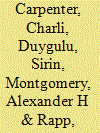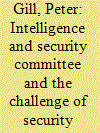| Srl | Item |
| 1 |
ID:
172088


|
|
|
| 2 |
ID:
131511


|
|
|
|
|
| Publication |
2014.
|
| Summary/Abstract |
Through a series of focus groups with human security practitioners, we examined how powerful organizations at the center of advocacy networks select issues for attention. Participants emphasized five sets of factors: entrepreneur attributes, adopter attributes, the broader political context, issue attributes, and intranetwork relations. However, the last two were much more consistently invoked by practitioners in their evaluations of specific candidate issues. Scholars of global agenda setting should pay particular attention to how intranetwork relations structure gatekeeper preferences within transnational advocacy spaces because these help constitute perceptions of issues' and actors' attributes in networks.
|
|
|
|
|
|
|
|
|
|
|
|
|
|
|
|
| 3 |
ID:
092460


|
|
|
|
|
| Publication |
2009.
|
| Summary/Abstract |
A major feature of current security is the development of intelligence networks between agencies within and between nations and across public and private sectors. The performance of the UK Intelligence and Security Committee (ISC) is examined within this context, especially regarding allegations of collusion by UK agencies in rendition and torture. Proposed changes to the ISC are discussed and it is argued that the ISC must seek to leverage its limited powers by helping to construct an oversight network.
|
|
|
|
|
|
|
|
|
|
|
|
|
|
|
|
| 4 |
ID:
139246


|
|
|
|
|
| Summary/Abstract |
The dominant societal discourse of actors comprising Israel's security networks influences their choices for solutions to the perceived existential threat to the state from the demands and actions of the Palestinian authorities. Israeli elites, who are identified with the liberal discourse, propose to solve this problem by withdrawing, either unilaterally or via a peace process, from the Judea and Samaria region conquered in the 1967 war. This discourse requires the ‘securitization’ of the political process and the framing of Israeli control of Judea, Samaria and Gaza as an existential burden. By framing the security narrative in this way, the liberal elite seeks to draw support from most Israelis, who subscribe to an alternative ethno-national discourse, for abandoning the region.
|
|
|
|
|
|
|
|
|
|
|
|
|
|
|
|